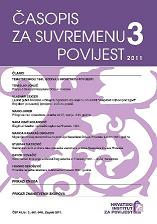Siegfried Kasche: njemački pogled na Hrvatsku 1941. godine
SIEGFRIED KASCHE: THE GERMAN VIEW OF CROATIA IN 1941
Author(s): Nada Kisić KolanovićSubject(s): History
Published by: Hrvatski institut za povijest
Keywords: Siegfried Kasche; Independent State of Croatia; Ustaša Movement; National Socialism
Summary/Abstract: This work studies the activities of Siegfried Kasche, the diplomatic representative of the Third Reich in the Independent State of Croatia (Nezavisna Država Hrvatska, NDH) from 1941 to 1945. Kasche’s position vis-à-vis the Ustaša ruling group and Croatian nationalism is examined through his papers and those of the criminal proceedings carried out against him in Zagreb at the High Court of the People’s Republic of Croatia in 1941. Although in his papers Kasche puts emphasis on the NDH as a natural model of the political evolution of Croatian nationalism, he discovers the parameters of Ustaša nationalism in the gamut of its coming into being during the clash of grand European politics, mass violence, and the Nazification of Croatia. We can number Kasche among those Germans who loudly expostulated for the political sovereignty of the NDH. As opposed to this group, there were German military leaders who from the outset advocated for the outright occupation of Croatia rather than its proclamation as an independent state; this proclamation in their minds should have been put off until a later date. Since Kasche often reacted in the manner of an ‘insider,’ this created a standing tension between him and German political and military circles. Kasche’s first task in the NDH in 1941 was to ensure sources for German economic development and military finances. By secret economic protocols agreed upon between Kasche and M. Lorković, the minister of foreign affairs (16 May 1941), Germany obtained a privileged position in the mining industry, especially in terms of the exploitation of bauxite. Despite the ardour of his National Socialism, Kasche was rather suspicious concerning the reciprocal influence of National Socialism upon the Ustaša movement. He attempts to elucidate this matter in terms of the assertion that National Socialism is rife with the political, social, and cultural life of Germany, which renders it a unique phenomenon and makes it difficult to export to other lands. In this sense, he proceeds from two observations: that the Ustaša movement was motivated by the ‘ideal of a state’ while National Socialism insisted on the ‘ideal of a people,’ and that the Ustaša movement, in contrast to National Socialism, had a positive attitude toward the Catholic Church. Kasche’s insider’s position in the NDH influenced German-Italian relations. As well known as the unfavourable boundary demarcation between the NDH and Mussolini’s Italy in May 1941 and the occupation of the coastal territory on the part of the Second Italian Army, was the terrible internal burden of the Ustaša government. Kasche described this problem as the “most important and most difficult problem which he faced in the NDH.” His task, nonetheless, consisted of maintaining “the best possible relations with Italy” which was especially difficult because Germany, indeed, did not wish to concede exclusive control of the Adriatic coast to Italy. After Kasche’s extradition to Yugoslavia...
Journal: Časopis za suvremenu povijest
- Issue Year: 43/2011
- Issue No: 3
- Page Range: 773-800
- Page Count: 28
- Language: Croatian

